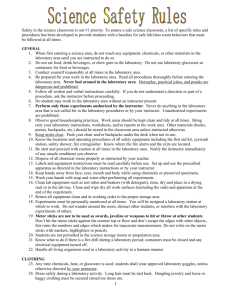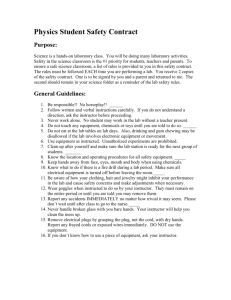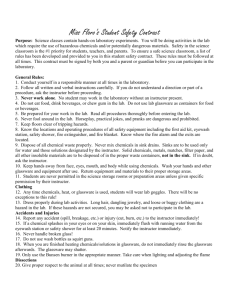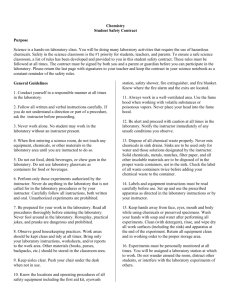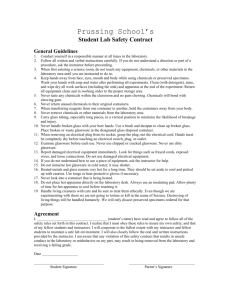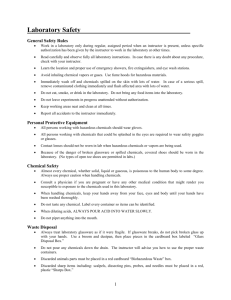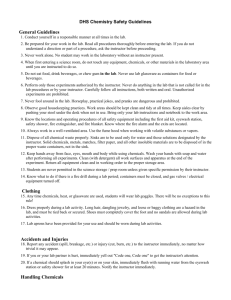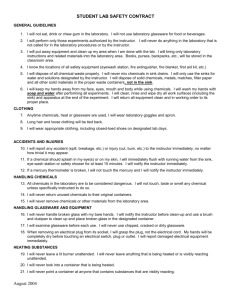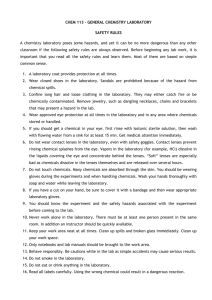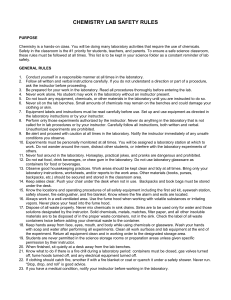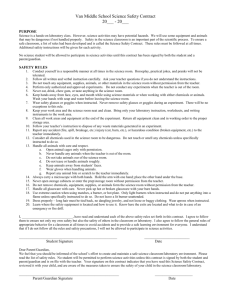Lab Safety Contract - Duplin County Schools
advertisement
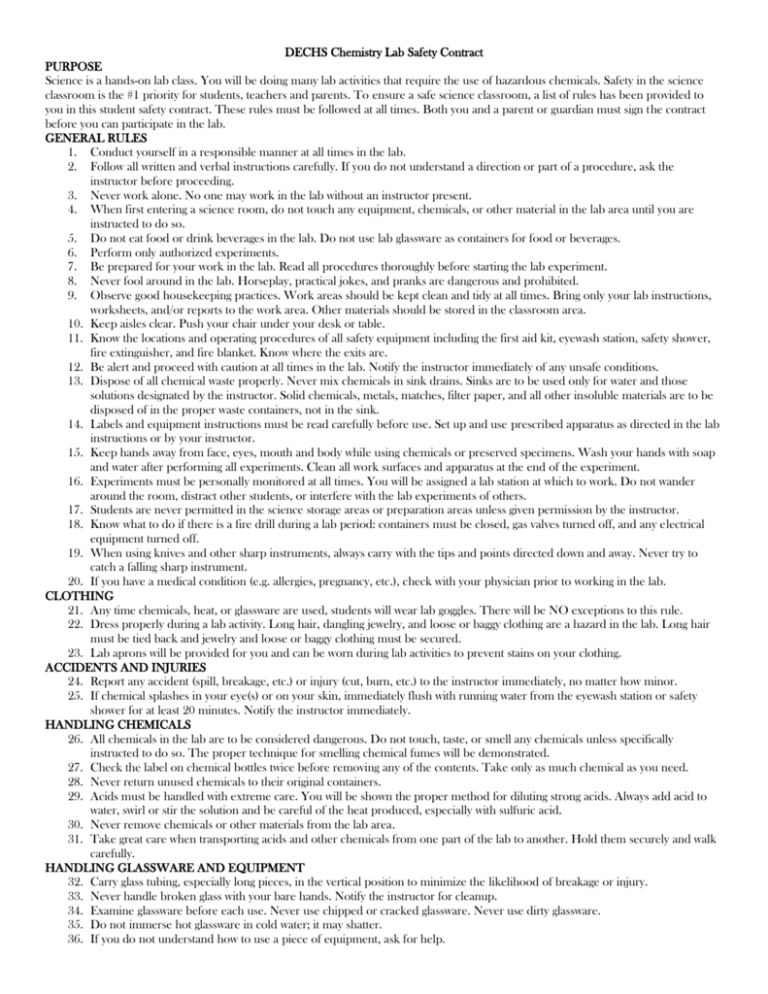
DECHS Chemistry Lab Safety Contract PURPOSE Science is a hands-on lab class. You will be doing many lab activities that require the use of hazardous chemicals. Safety in the science classroom is the #1 priority for students, teachers and parents. To ensure a safe science classroom, a list of rules has been provided to you in this student safety contract. These rules must be followed at all times. Both you and a parent or guardian must sign the contract before you can participate in the lab. GENERAL RULES 1. Conduct yourself in a responsible manner at all times in the lab. 2. Follow all written and verbal instructions carefully. If you do not understand a direction or part of a procedure, ask the instructor before proceeding. 3. Never work alone. No one may work in the lab without an instructor present. 4. When first entering a science room, do not touch any equipment, chemicals, or other material in the lab area until you are instructed to do so. 5. Do not eat food or drink beverages in the lab. Do not use lab glassware as containers for food or beverages. 6. Perform only authorized experiments. 7. Be prepared for your work in the lab. Read all procedures thoroughly before starting the lab experiment. 8. Never fool around in the lab. Horseplay, practical jokes, and pranks are dangerous and prohibited. 9. Observe good housekeeping practices. Work areas should be kept clean and tidy at all times. Bring only your lab instructions, worksheets, and/or reports to the work area. Other materials should be stored in the classroom area. 10. Keep aisles clear. Push your chair under your desk or table. 11. Know the locations and operating procedures of all safety equipment including the first aid kit, eyewash station, safety shower, fire extinguisher, and fire blanket. Know where the exits are. 12. Be alert and proceed with caution at all times in the lab. Notify the instructor immediately of any unsafe conditions. 13. Dispose of all chemical waste properly. Never mix chemicals in sink drains. Sinks are to be used only for water and those solutions designated by the instructor. Solid chemicals, metals, matches, filter paper, and all other insoluble materials are to be disposed of in the proper waste containers, not in the sink. 14. Labels and equipment instructions must be read carefully before use. Set up and use prescribed apparatus as directed in the lab instructions or by your instructor. 15. Keep hands away from face, eyes, mouth and body while using chemicals or preserved specimens. Wash your hands with soap and water after performing all experiments. Clean all work surfaces and apparatus at the end of the experiment. 16. Experiments must be personally monitored at all times. You will be assigned a lab station at which to work. Do not wander around the room, distract other students, or interfere with the lab experiments of others. 17. Students are never permitted in the science storage areas or preparation areas unless given permission by the instructor. 18. Know what to do if there is a fire drill during a lab period: containers must be closed, gas valves turned off, and any electrical equipment turned off. 19. When using knives and other sharp instruments, always carry with the tips and points directed down and away. Never try to catch a falling sharp instrument. 20. If you have a medical condition (e.g. allergies, pregnancy, etc.), check with your physician prior to working in the lab. CLOTHING 21. Any time chemicals, heat, or glassware are used, students will wear lab goggles. There will be NO exceptions to this rule. 22. Dress properly during a lab activity. Long hair, dangling jewelry, and loose or baggy clothing are a hazard in the lab. Long hair must be tied back and jewelry and loose or baggy clothing must be secured. 23. Lab aprons will be provided for you and can be worn during lab activities to prevent stains on your clothing. ACCIDENTS AND INJURIES 24. Report any accident (spill, breakage, etc.) or injury (cut, burn, etc.) to the instructor immediately, no matter how minor. 25. If chemical splashes in your eye(s) or on your skin, immediately flush with running water from the eyewash station or safety shower for at least 20 minutes. Notify the instructor immediately. HANDLING CHEMICALS 26. All chemicals in the lab are to be considered dangerous. Do not touch, taste, or smell any chemicals unless specifically instructed to do so. The proper technique for smelling chemical fumes will be demonstrated. 27. Check the label on chemical bottles twice before removing any of the contents. Take only as much chemical as you need. 28. Never return unused chemicals to their original containers. 29. Acids must be handled with extreme care. You will be shown the proper method for diluting strong acids. Always add acid to water, swirl or stir the solution and be careful of the heat produced, especially with sulfuric acid. 30. Never remove chemicals or other materials from the lab area. 31. Take great care when transporting acids and other chemicals from one part of the lab to another. Hold them securely and walk carefully. HANDLING GLASSWARE AND EQUIPMENT 32. Carry glass tubing, especially long pieces, in the vertical position to minimize the likelihood of breakage or injury. 33. Never handle broken glass with your bare hands. Notify the instructor for cleanup. 34. Examine glassware before each use. Never use chipped or cracked glassware. Never use dirty glassware. 35. Do not immerse hot glassware in cold water; it may shatter. 36. If you do not understand how to use a piece of equipment, ask for help. HEATING SUBSTANCES 37. Exercise extreme caution when using a gas burner. Take care that hair, clothing, and hands are a safe distance from the flame at all times. Do not put any substance into the flame unless specifically instructed to do so. Never reach over an exposed flame. Light gas burners only as instructed by the teacher. 38. Never leave a lit burner unattended. Never leave anything that is being heated or is visibly reacting unattended. Always turn the burner/hot plate off when not in use. 39. You will be instructed in the proper method of heating liquids in test tubes. Do not point the open end of a test tube being heated at yourself or anyone else. 40. Heated metals and glass remain very hot for a long time. They should be set aside to cool and picked up with caution. Use tongs or protective gloves if needed. 41. Never look into a container that is being heated. 42. Do not place hot items directly on the lab desk. Use an insulating pad. Allow time for hot apparatus to cool before touching. QUESTIONS 43. Do you wear contact lenses? Yes No 44. Do you have allergies? If so, please list ________________________________ CONTACT LENSES SHOULD NOT BE WORN IN CHEMISTRY LABS! This is the recommendation of the American Chemical Society. Students who wear contact lenses are advised to remove them before participating in chemical labs. If you are unable to remove your contact lenses, you will be required to wear wrap-around goggles instead of safety glasses. This is for your protection. Our lab is equipped with an eyewash station and safety shower. These are safety items—NOT TOYS! Any student who tampers with this equipment will be immediately removed from the lab and referred for disciplinary action. I WILL NOT compromise on issues of lab safety. Safety Contract Agreement Student I, ___________________________________, have read and agree to follow all of the safety rules set forth in this contract. I realize that I must obey these rules to insure my own safety and that of my fellow students and instructors. I will cooperate to the fullest extent with my instructor and fellow students to maintain a safe lab environment. I will also closely follow the instructions provided by the instructor. I am aware that any violation of this safety contract that results in unsafe conduct in the lab or misbehavior on my part may result in being removed from the lab, detention, and/or receiving a failing grade. Student signature ______________________________________________ Date______________________________ Dear Parent or Guardian We feel that you should be informed regarding the school’s effort to create and maintain a safe science classroom/lab environment. You should be aware of the safety instructions your student will receive before engaging in any lab work. Please read the list of safety rules above. Your signature on this contract indicates that you have read this Student Safety Contract, are aware of the measures taken to insure the safety of your student in the science lab, and will instruct your student to uphold his/her agreement to follow these rules and procedures in the lab. Parent/Guardian Signature___________________________________ Date_________________________________
